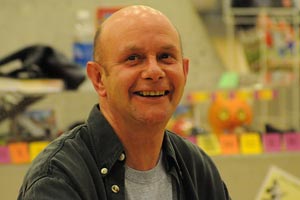
Reto Caduff
For a special section in our May/June issue, we asked some of our favorite writers about their favorite nonfiction books. Here are Pulitzer Prize-winning novelist Michael Chabon’s answers:
Mother Jones: What nonfiction book do you foist on friends and relatives? Explain.
Michael Chabon: I don’t do a lot of foisting, because when it comes to books I don’t really like to be foisted upon. But I’m always happy to find somebody else who loves the work of Lewis Hyde (Trickster Makes This World, The Gift) as much as I do. And I think I’ve been talking about Slavoj Zizek a little too much lately.
MJ: The work of nonfiction you’ve reread the most?
MC: I guess it would be Walter Benjamin’s Illuminations, particularly the essays “The Work of Art in the Age of Mechanical Reproduction,” “The Storyteller,” and especially the “Theses on the Philosophy of History,” which every time I finish it feels as if it was made out of something more evanescent than words. Also a continual rereader of John Clute’s Encyclopedia of Fantasy—actually a single, immense, thrilling work of literary theory disguised as a reference book.
MJ: Nonfiction book someone gave you as a kid that left a lasting impression?
MC: That would be The Miracle of Language (Fawcett World Library, 1953), an obscure paperback history of language to be found on the TV-room shelf at my grandparents’ house in Silver Spring, Maryland; clear and well-written and fascinating. I used to read it so often when I visited that eventually he gave it to me, in 1985, with the penciled inscription: “To Mike—A budding writer should know the tools of his trade. Grandpa.”
MJ: As an enthusiast of the comic form, which graphic novelists make you salivate as you await their next book?
MC: Big fan of the Brits: Eddie Campbell, Warren Ellis, Neil Gaiman, Alan Moore, Grant Morrison. Open the door to include them along with Amis, McEwen, Rushdie, Moorcock, Byatt, Zadie Smith, David Mitchell, et al, and I think you could argue that over the past 20 years British literature has been going through one of the most vital and interesting periods in its history.
MJ: Whose nonfiction work do you find is more out there than your own fictional creations?
MC: Oh, no. Not going to get me to accept the premise of that one.
MJ: If I said, here’s a million bucks, write me some long-form nonfiction, what would you first think to write about?
MC: The false history of baseball (Doubleday, Cooperstown), the real history of baseball (town ball, Cartwright), all the colorful characters and hucksters and autocrats and players of which they’re both composed, and how the interplay of the deliberate lie and the obscured truth is so emblematic of American historiography in general.
Follow Michael Mechanic on Twitter.
















